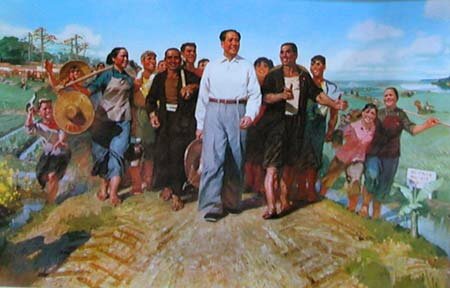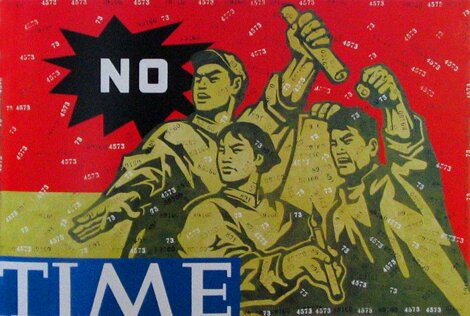You must go home again…
“Loneliness is and always has been the central and inevitable experience of every man.”
—Thomas Wolfe
I generally solicit views on current events from my students during the first few minutes of a class. It allows them to decompress from submersion in previous courses, informs me about what is current in Chinese student circles and points up, by their unintended omissions, what news as been missed by them via censorship or time constraints. During “current events” this week we reviewed, the “Great Spoon Heist” on campus: It seems that 500 stainless steel spoons had vanished and now the students are forced to eat from utensils with holes drilled in their bellies–which is now kinda tough on the soup lovers I am guessing. And students also told me of the Sakura scandal at Wuhan University–nationally revered for its lush greenery and traditional architecture– in the north of China. Last week a mother and her daughter were run off of campus and vilified on the Internet for taking pictures while dressed in Japanese Kimonos in front of the famed Sakura trees. They were the on the receiving end of local wrath for ignorance regarding the history of the blossoms.
Sakura were first planted by the Imperial Japanese Army occupying the campus during the war years because they were homesick (Thankfully, instead of acts of rape, pillage and plunder they planted flowers and I am guessing did not wear Kimonos to do it…), but those particular Cherry Blossoms died some time later and the Japanese government, so I am told, sent more later as a gift and the remaining 60 or so trees now attract tens of thousands of visitors annually who admire their beauty–and manage to stay a sight more sober in the process than do the Japanese during their viewings in Japan…**
After current events I then told classes about my recent flight into Bangkok, where I was headed for medical treatment, during which time I noticed that the man in the seat next to me reading a Japanese newspaper. Since I am accosted 2-3 times a week for impromptu English practice– and end up feeling more like a parrot than a professor–I thought I’d mediate my 40-year old discomfort with flying and get in some language practice by chatting him up. He surprised me: quickly after he recovered from the shock of a white male on a flight to Thailand from China speaking Japanese he used my earnest attention to tell me of the woes of a Japanese expat living in China. He missed his family, still in Tokyo, had trouble making friends with Chinese nationals (imagine that) and told me how weary he had become of frequent trips to Thailand required by his position. He would never have shared his grief, for sake of losing face or not appearing strong, with a native Japanese, and seemed increasingly happy as he spoke. After his confessional experience he left the plane devoid of the sullen look he had carried on as baggage.
I recognized the look on his face: He was in the midst of haggling with what I have come to call Expats Syndrome. It is depression brought on via cultural disconnection. We all go through it at one time or another and it can steel our resolve or send us headlong into the cultural abyss. It is a a lack of grounding that finds us grasping for tethers–some healthy and some not.
Gestalt Therapist and Holocaust survivor Fritz Perls once observed several children on a beach each react differently to an incoming wave (glee, flight, terrified incapacitation…) and theorized that we are all genetically predisposed to react differently to stressors. In addition to the excitement and challenge of living abroad, expatriate adventures can be a bit fugitive, solitary and hence stressful regardless of whether you are visiting a far shore to spiritually conquer, study, invade, visit or do business with the natives who reside there. In recent weeks I have watched expats cope with waking up in a darkening economic environment by engaging in extramarital dalliances with alcohol or women, depression that has functionally paralyzed them or through fleeing homeward toward Europe Canada or America…. Conversely, One British friend in Hong Kong who recently has lost a substantial portion of his business to a partner company’s reorganization took the loss like a true entrepreneur and announced to me: “We have had a bit of a set-back.” It was not British stoicism or stiff-upper-lip behavior, but rather a declaration of war by an emotionally well outfitted businessman who will certainly outlast any opponent.
Once outside of themselves again and the country they adopted or were sent to explore, many of my friends find themselves more disoriented than ever before. Being disconnected, even for a few months, from the indeterminate and comforting familiarity of the constellations of their youth or most recent native home can render the sights and sounds there unrecognizable. TV shows have gone off the air ( I have been gone so long I am still mourning the loss of Cheers and MASH), schools have closed, businesses have shuttered and friends moved on or passed away. As an aside: during my first trip back to America in three years recently passed by Ft. Ord, where I did military basic training, and saw that a school had replaced the wooden barracks and later learned that there was little left of the the 1/2 billion dollar Mississippi ammunition plant where I had served as XO in the late 70’s–it’s been in mothballs for more than a decade. It is hard to describe the waves of mortality that vibrate their way through every wrinkle and scar you have earned in the years since those times and harder to explain how foreign you can suddenly feel in your own country.
When I reached my hotel room in Thailand I discovered an article in the International Herald Tribune about foreigners who, because of the cost of overseas postings, had been called home early by cost conscious companies, and were wearied and disoriented upon their return even though their assignments had been short. The story was fundamentally a critique of businesses who do not prepare expats for re-entry….
Several years ago I visited Angel Fire New Mexico and the Disabled American Veterans Vietnam Memorial there. It is built on land considered sacred to Indians and the spot where a ceremonial march for Vietnam returnees was held and at its conclusion veterans were initiated into traditional tribal rituals normally reserved for Indian warriors returning from battle. “Native Americans” were wise enough to know that transitioning back to society required care, diligence and ceremonial reintroductions what for others might be seen as mundane. I think the huge number of homeless and jailed veterans is due in large part to our neglect of returnees and a misguided belief that they can safely reintegrate after experiencing months or years of traumatic events. The veterans who took part in that long march still talk of its healing virtues.
As more warriors return from battle, more economic refugees land on Chinese shores and more western sea turtles head back to their nesting grounds there will be problems. And while the Chinese use an idiom that admonishes us against the danger of having a foot in two boats, I argue that we must stay grounded in our home culture via news, music, movies, art, conversation, books, or blogs while slowly immersing ourselves in a new one. We all cannot be as strong as my friend in Hong Kong and while we well may be hard-wired as to how we’ll respond to stress, but we can mediate the magnitude of our reactions by keeping tethered somehow to home. I just came out of a numb sleep brought on by being ill and having little to grasp onto for comfort, but I am a very lucky veteran traveler who has amazing, loving, keen observers as friends. They threw a line into the abyss. I wish this kind of good fortune on others.
We must go home again, if only virtually, from time to time…
More in a part II
**related Cherry Blossom stories: CHINA SMACK (with hilarious comments by readers below the story) and the
Uncategorized



















